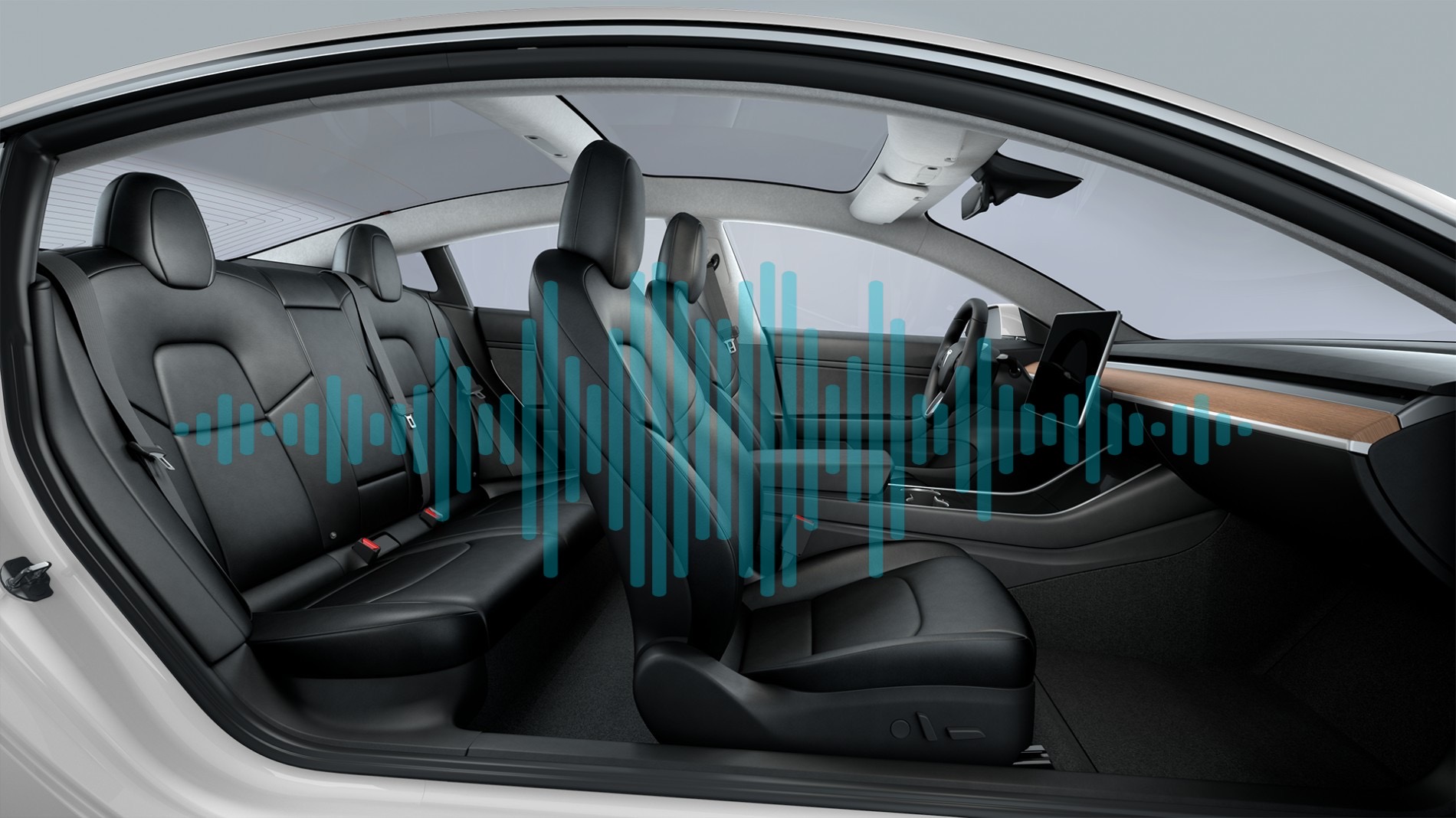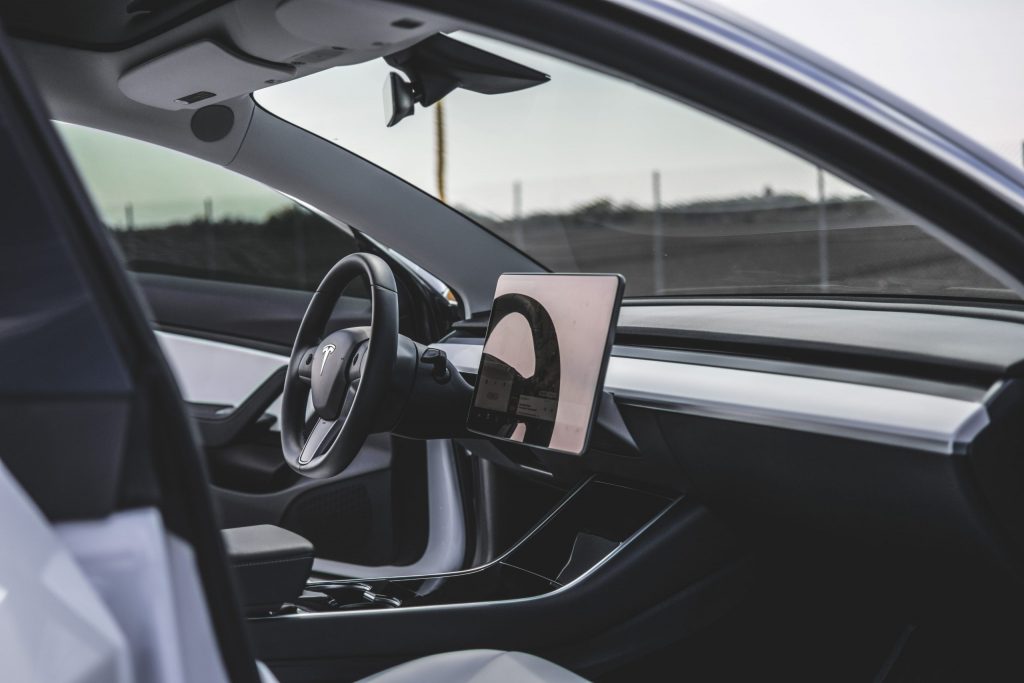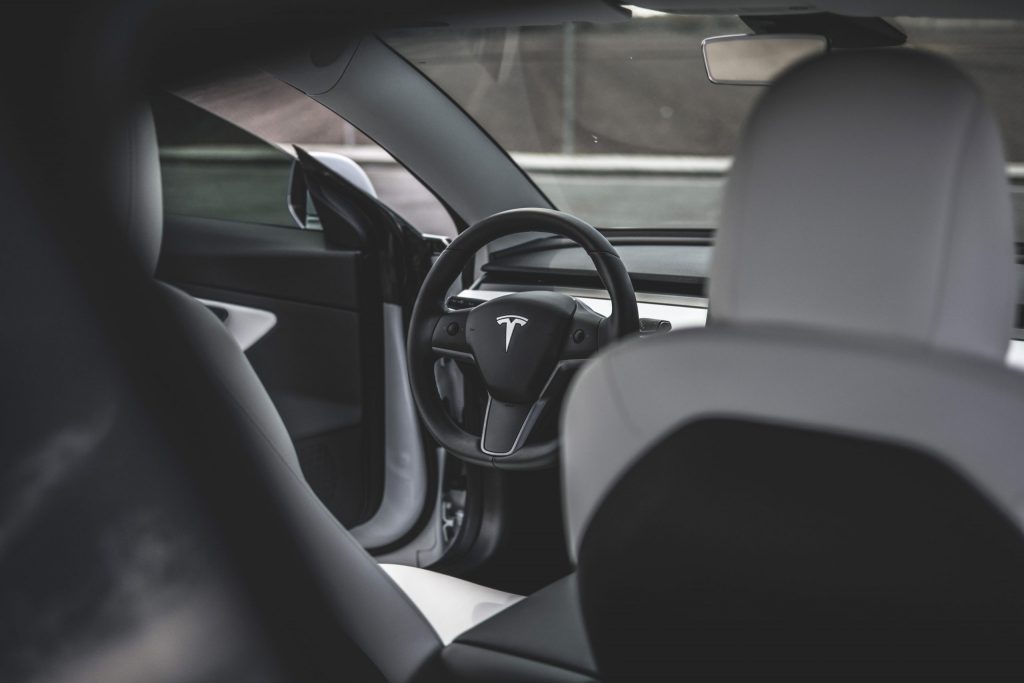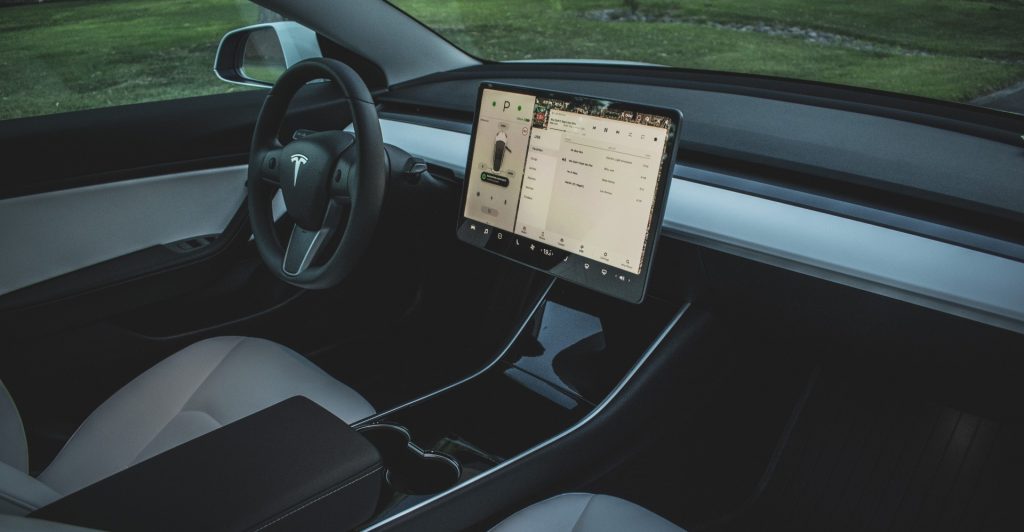

News
Tesla audio partner DSP Concepts discusses noise cancellation tech & the future of sound in autonomous cars
Sound might play a bigger role in the auto industry with the advent of the electric cars and the age of autonomous vehicles dawning. Tesla’s audio partner DSP Concepts (DSPC) knows a lot about sound and how big of a role it plays in everyday life. Teslarati spoke with part of the DSP Concepts team, who revealed the significance of sound in vehicles, especially as the electric car revolution starts to hit its stride.
“It turns out a car is your most complicated audio product,” said Chin Beckmann, the co-founder and CEO of DSP Concepts. Beckmann described all the ways audio and sound play a part in how people interact with their vehicles, like phone calls, voice commands, or simple in-car communication from driver to passenger and vice versa.
Engine noise cancellation is a feature that interests traditional cars owners as well. Inversely, for electric car owners, engine noise enhancements or noisemakers have become a sought after feature, particularly in the United States where it is mandatory for EVs.

Tesla probably contributed to the popularity of noisemakers in vehicles with its recently-released Boombox feature, which allows drivers to play sounds through an external speaker. Funnily enough, EV owners seeking to increase the noise coming out of their vehicles, may also be looking for ways to decrease the sounds coming into their cars.
“There’s a lot of interest in road noise cancellation from EVs,” said Dr. Paul Beckmann, founder and CTO of DSP Concepts.
Last month, DSP Concepts announced that Audio Weaver would port Bose’s QuietComfort Road Noise Control (RNC) technology into its platform. The collaboration meant that car companies using the Audio Weaver platform, like Tesla, Porsche, or BMW, could offer Bose’s QuietComfort RNC to their vehicles.

Dr. Beckmann clarified, however, that some hardware needs to be integrated into the vehicle for the Bose QuietComfort RNC to work.
“The way the RNC works is it uses microphones inside the car to listen. It’s kind of like those active noise cancelling headphones. The headphones have microphones close by your ears. So [for] the retrofit, you’d have to put microphones, maybe, by the headrest or somewhere close to your ears,” he shared with Teslarati.
Dru Wynings, Sr. Director of Marketing at DSP Concepts, added that some sensors would probably be needed in the car’s chassis as well. He also talked about the complexities of bringing Bose’s QuietComfort RNC to vehicles.
“There’s a huge hardware component to it in terms of how much computation is needed, in terms of what their audio sound system is…all of that could take a toll. So, [automakers are] planning on what could actually fit on this specific chip to run this software,” said Wynings.
DSP Concepts did not reveal any details about Bose RNC coming to Tesla vehicles. There’s really no telling what features Tesla will roll out to its vehicles at the end of the day.
However, the possibility is very high. It isn’t too far-fetched to think that Tesla might have already equipped its vehicles with the necessary hardware for features like Bose’s QuietComfort RNC, especially considering the upcoming release of the much-anticipated Model S and Model X refresh. The company already did something similar with its in-cabin camera. The hardware for the camera feature was equipped well before it was enabled via an OTA software update.
Road noise cancellation seems like a premium feature that could be available for Tesla’s top-tier vehicles, like the Model S and Model X. Or Tesla may roll out the Bose RNC feature to its entire fleet in a later update. After all, the Model 3 just had a refresh as well.
Sound in Autonomous Vehicles
Aside from Tesla, DSP Concepts works with an array of automakers in the industry, both old and new companies. The company’s main goal is to bring audio engineering into the 21st century with the help of Audio Weaver.
When it comes to the auto industry, DSPC seems very aware of how audio in cars will evolve as autonomy enters the industry. It has become evident that car companies, both legacy and startups, have started producing more tech-savvy vehicles.
Tesla vehicles might be the most tech-savvy cars on the market. The EV manufacturer’s cars incorporate technology that people might look for in their vehicles now, like Netflix, Spotify, or even Caraoke. Yes, these features might not be necessary, but the same argument could be made for phones, laptops, or other devices.

People can do much more than call others with their phones now. They can watch their favorite shows, listen to music, search the internet and much, much more. People seem to want their tech to be well-rounded, so why not their vehicles?
Other car makers seem to be following Tesla’s footsteps. In addition to making more tech-oriented vehicles, more auto companies are also exploring autonomous cars.
With autonomy in the picture, features like Tesla Theater or Tesla Arcade will be more utilized and with that comes the significance of sound. DSP Concepts understands that people might start looking for better sound quality in their autonomous vehicles as more entertainment options are offered by car companies.
The Teslarati team would appreciate hearing from you. If you have any tips, email us at tips@teslarati.com or reach out to me at maria@teslarati.com.
News
Tesla begins Robotaxi certification push in Arizona: report
Tesla seems serious about expanding its Robotaxi service to several states in the coming months.

Tesla has initiated discussions with Arizona transportation regulators to certify its driverless Robotaxi service in the state, as per a recent report from Bloomberg News. The move follows Tesla’s launch of its Robotaxi pilot program in Austin, Texas, as well as CEO Elon Musk’s recent comments about the service’s expansion in the Bay Area.
The Arizona Department of Transportation confirmed to Bloomberg that Tesla has reached out to begin the certification process for autonomous ride-sharing operations in the state. While details remain limited, the outreach suggests that Tesla is serious about expanding its driverless Robotaxi service to several territories in the coming months.
The Arizona development comes as Tesla prepares to expand its service area in Austin this weekend, as per CEO Elon Musk in a post on X. Musk also stated that Tesla is targeting the San Francisco Bay Area as its next major market, with a potential launch “in a month or two,” pending regulatory approvals.
Tesla first launched its autonomous ride-hailing program on June 22 in Austin with a small fleet of Model Y vehicles, accompanied by a Tesla employee in the passenger seat to monitor safety. While still classified as a test, Musk has said the program will expand to about 1,000 vehicles in the coming months. Tesla will later upgrade its Robotaxi fleet with the Cyercab, a two-seater that is designed without a steering wheel.
Sightings of Cybercab castings around the Giga Texas complex suggests that Tesla may be ramping the initial trial production of the self-driving two-seater. Tesla, for its part, has noted in the past that volume production of the Cybercab is expected to start sometime next year.
In California, Tesla has already applied for a transportation charter-party carrier permit from the state’s Public Utilities Commission. The company is reportedly taking a phased approach to operating in California, with the Robotaxi service starting with pre-arranged rides for employees in vehicles with safety drivers.
News
Tesla sets November 6 date for 2025 Annual Shareholder Meeting
The automaker announced the date on Thursday in a Form 8-K.

Tesla has scheduled its 2025 annual shareholder meeting for November 6, addressing investor concerns that the company was nearing a legal deadline to hold the event.
The automaker announced the date on Thursday in a Form 8-K submitted to the United States Securities and Exchange Commission (SEC). The company also listed a new proposal submission deadline of July 31 for items to be included in the proxy statement.
Tesla’s announcement followed calls from a group of 27 shareholders, including the leaders of large public pension funds, which urged Tesla’s board to formally set the meeting date, as noted in a report from The Wall Street Journal.
The group noted that under Texas law, where Tesla is now incorporated, companies must hold annual meetings within 13 months of the last one if requested by shareholders. Tesla’s previous annual shareholder meeting was held on June 13, 2024, which placed the July 13 deadline in focus.
Tesla originally stated in its 2024 annual report that it would file its proxy statement by the end of April. However, an amended filing on April 30 indicated that the Board of Directors had not yet finalized a meeting date, at least at the time.
The April filing also confirmed that Tesla’s board had formed a special committee to evaluate certain matters related to CEO Elon Musk’s compensation plan. Musk’s CEO performance award remains at the center of a lengthy legal dispute in Delaware, Tesla’s former state of incorporation.
Due to the aftermath of Musk’s legal dispute about his compensation plan in Delaware, he has not been paid for his work at Tesla for several years. Musk, for his part, has noted that he is more concerned about his voting stake in Tesla than his actual salary.
At last year’s annual meeting, TSLA shareholders voted to reapprove Elon Musk’s compensation plan and ratified Tesla’s decision to relocate its legal domicile from Delaware to Texas.
Elon Musk
Grok coming to Tesla vehicles next week “at the latest:” Elon Musk
Grok’s rollout to Tesla vehicles is expected to begin next week at the latest.

Elon Musk announced on Thursday that Grok, the large language model developed by his startup xAI, will soon be available in Tesla vehicles. Grok’s rollout to Tesla vehicles is expected to begin next week at the latest, further deepening the ties between the two Elon Musk-led companies.
Tesla–xAI synergy
Musk confirmed the news on X shortly after livestreaming the release of Grok 4, xAI’s latest large language model. “Grok is coming to Tesla vehicles very soon. Next week at the latest,” Musk wrote in a post on social media platform X.
During the livestream, Musk and several members of the xAI team highlighted several upgrades to Grok 4’s voice capabilities and performance metrics, positioning the LLM as competitive with top-tier models from OpenAI and Google.
The in-vehicle integration of Grok marks a new chapter in Tesla’s AI development. While Tesla has long relied on in-house systems for autonomous driving and energy optimization, Grok’s integration would introduce conversational AI directly into its vehicles’ user experience. This integration could potentially improve customer interaction inside Tesla vehicles.
xAI and Tesla’s collaborative footprint
Grok’s upcoming rollout to Tesla vehicles adds to a growing business relationship between Tesla and xAI. Earlier this year, Tesla disclosed that it generated $198.3 million in revenue from commercial, consulting, and support agreements with xAI, as noted in a report from Bloomberg News. A large portion of that amount, however, came from the sale of Megapack energy storage systems to the artificial intelligence startup.
In July 2023, Musk polled X users about whether Tesla should invest $5 billion in xAI. While no formal investment has been made so far, 68% of poll participants voted yes, and Musk has since stated that the idea would be discussed with Tesla’s board.
-

 Elon Musk1 week ago
Elon Musk1 week agoTesla investors will be shocked by Jim Cramer’s latest assessment
-

 Elon Musk20 hours ago
Elon Musk20 hours agoxAI launches Grok 4 with new $300/month SuperGrok Heavy subscription
-

 Elon Musk3 days ago
Elon Musk3 days agoElon Musk confirms Grok 4 launch on July 9 with livestream event
-

 News7 days ago
News7 days agoTesla Model 3 ranks as the safest new car in Europe for 2025, per Euro NCAP tests
-

 Elon Musk2 weeks ago
Elon Musk2 weeks agoA Tesla just delivered itself to a customer autonomously, Elon Musk confirms
-

 Elon Musk1 week ago
Elon Musk1 week agoxAI’s Memphis data center receives air permit despite community criticism
-

 Elon Musk2 weeks ago
Elon Musk2 weeks agoTesla’s Omead Afshar, known as Elon Musk’s right-hand man, leaves company: reports
-

 News2 weeks ago
News2 weeks agoXiaomi CEO congratulates Tesla on first FSD delivery: “We have to continue learning!”
















